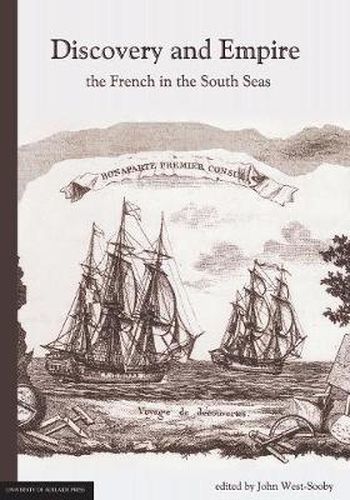Readings Newsletter
Become a Readings Member to make your shopping experience even easier.
Sign in or sign up for free!
You’re not far away from qualifying for FREE standard shipping within Australia
You’ve qualified for FREE standard shipping within Australia
The cart is loading…






This title is printed to order. This book may have been self-published. If so, we cannot guarantee the quality of the content. In the main most books will have gone through the editing process however some may not. We therefore suggest that you be aware of this before ordering this book. If in doubt check either the author or publisher’s details as we are unable to accept any returns unless they are faulty. Please contact us if you have any questions.
‘The French connection with the South Seas stretches back at least as far as the voyage of Binot Paulmier de Gonneville (1503-1505), who believed he had discovered the fabled great south land after being blown off course during a storm near the Cape of Good Hope. The story of his voyage remained largely forgotten for over 150 years, but eventually resurfaced in 1664 thanks to the publication by the Abbe Jean Paulmier of a document in which he argued, on the basis of this supposed discovery, for the establishment of a Christian mission in this third part of the world. While historians today contest the authenticity of various aspects of the Abbe Paulmier’s Memoires, there is no doubt about the impact it had in France, both on the collective imagination and, more concretely, on French plans for exploration and colonial expansion. It was not until the eighteenth century, however, that France began sending mariners to the southern oceans on a regular basis, and by that time a new maritime power had begun to emerge: Great Britain. Together, these two nations would play a decisive role in determining the configuration of these little known parts of the globe, and particularly of the Pacific, which had for so long been the almost exclusive preserve of Spain.’ (From the Introduction by John West-Sooby.)
Discovery and Empire is a collection of essays originating out of a symposium that was held at the State Library of South Australia on 8 July 2009. The symposium formed one of the strands of the XVIIth Biennial Conference of the Australasian Association of European Historians (6-9 July 2009), the overall theme for which was ‘Europe’s Expansions and Contractions’.
$9.00 standard shipping within Australia
FREE standard shipping within Australia for orders over $100.00
Express & International shipping calculated at checkout
This title is printed to order. This book may have been self-published. If so, we cannot guarantee the quality of the content. In the main most books will have gone through the editing process however some may not. We therefore suggest that you be aware of this before ordering this book. If in doubt check either the author or publisher’s details as we are unable to accept any returns unless they are faulty. Please contact us if you have any questions.
‘The French connection with the South Seas stretches back at least as far as the voyage of Binot Paulmier de Gonneville (1503-1505), who believed he had discovered the fabled great south land after being blown off course during a storm near the Cape of Good Hope. The story of his voyage remained largely forgotten for over 150 years, but eventually resurfaced in 1664 thanks to the publication by the Abbe Jean Paulmier of a document in which he argued, on the basis of this supposed discovery, for the establishment of a Christian mission in this third part of the world. While historians today contest the authenticity of various aspects of the Abbe Paulmier’s Memoires, there is no doubt about the impact it had in France, both on the collective imagination and, more concretely, on French plans for exploration and colonial expansion. It was not until the eighteenth century, however, that France began sending mariners to the southern oceans on a regular basis, and by that time a new maritime power had begun to emerge: Great Britain. Together, these two nations would play a decisive role in determining the configuration of these little known parts of the globe, and particularly of the Pacific, which had for so long been the almost exclusive preserve of Spain.’ (From the Introduction by John West-Sooby.)
Discovery and Empire is a collection of essays originating out of a symposium that was held at the State Library of South Australia on 8 July 2009. The symposium formed one of the strands of the XVIIth Biennial Conference of the Australasian Association of European Historians (6-9 July 2009), the overall theme for which was ‘Europe’s Expansions and Contractions’.